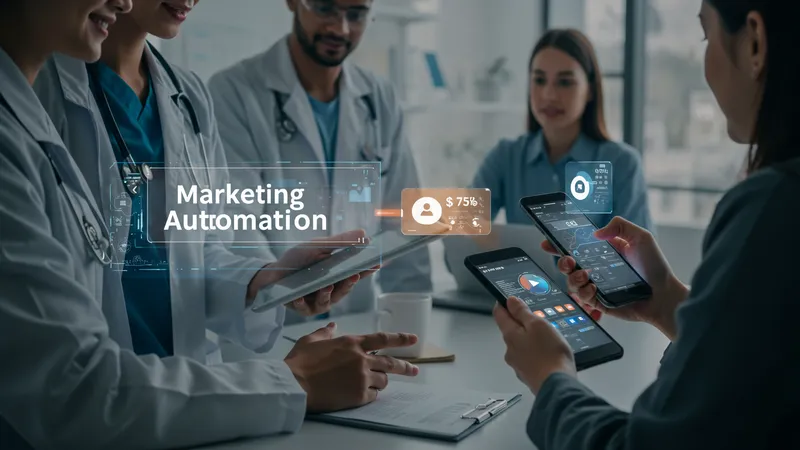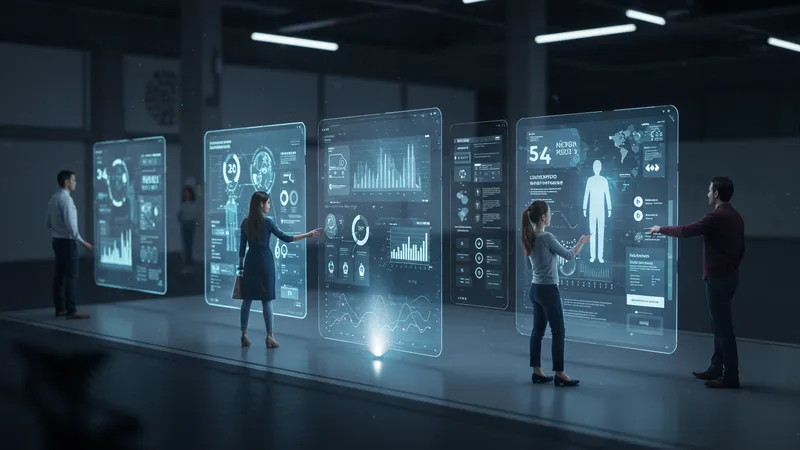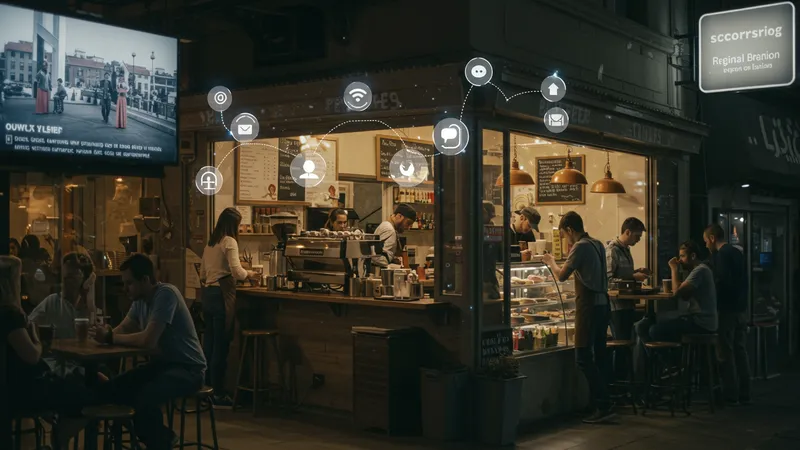

Imagine a world where your marketing efforts run smoothly on autopilot, generating leads and sales without you lifting a finger. It's not a fantasy—it's reality with the right tools!
As businesses pivot to digital fast-lanes, the competition for attention is fiercer than ever. Understanding automation isn't just beneficial; it's a game-changer that could save your business.

It's shocking how many businesses still resist automation, opting for outdated methods. For instance, a firm simply integrating Zoho increased leads by 30% in a month! How? By automating repetitive marketing tasks, the company freed up resources for creative strategies. But that’s not even the wildest part…
You'd think such gains come at significant cost—and they sometimes do—yet the return on investment for HubSpot users has other marketers dropping their jaw. Many reported immediate growth just by utilizing its integration capabilities. You might be wondering, with such results, what could possibly be the downside? But there’s still more to uncover…
While these tools offer impressive features, something unexpected happens next that even seasoned experts didn't anticipate. Stay with us as we delve deeper into the tranquil reality of marketing automation:
What's often overlooked with marketing automation is how it dramatically boosts customer engagement. By employing sophisticated frameworks, marketers can personalize messages, touching base with clients more effectively. This level of tailored communication enhances user experience, turning transactions into relationships.

Research shows personalized emails generate six times more revenue than non-personalized ones. Yet, companies neglect this due to misconceptions about the complexity of automation systems. But upon diving deeper, the ease of use can baffle even the skeptics.
You'll find that the interface simplicity is strategic—HubSpot offers drag-and-drop workflows that non-tech users can master with minimal training. Upon realizing this, businesses begin to imagine endless potential in their marketing endeavors.
Consider the impact of integrating insightful analytics into these workflows; all of a sudden, you're not just reaching out blindly—your approach is data-driven and targeted. The engagement rates skyrocket, but this is just the start of what's possible…
Automation tools are not just limited to email campaigns. They extend into areas like social media scheduling, lead management, and customer journey mapping. This expansion is where real innovation lies, unveiling new avenues for engagement.

For example, Zoho MarketingHub enables cross-platform promotions, ensuring consistent brand presence. What's surprising is how few organizations tap into these features, leaving untapped potential for competitors to leverage.
Social media posts can be scheduled in advance, taking advantage of peak user times without manual oversight. This not only saves time but ensures optimization of consumer interactions. The ripple effects are substantial, driving engagement and growth beyond traditional metrics.
And here's the kicker: marketers can effortlessly track the success of these campaigns. Real-time analytics provide clarity into what's working, allowing swift adjustments. This adaptability is crucial in a fast-paced digital world, but there's even more to discover…
One might assume these tools are reserved for large enterprises with hefty budgets. However, small businesses are the true beneficiaries, leveraging automation to punch above their weight.

With starting costs significantly lower than expected, automation democratizes marketing opportunities. It's fascinating how, with minimum investment, small teams can generate high-quality leads that were previously inaccessible.
Consider local retailers who, using basic automation, multiply their seasonal reach, competing effectively with larger brands. This strategy creates a level playing field, where service excellence can be pursued alongside innovative marketing tactics.
For many small business owners, entering the automated marketing landscape sparks a wave of creativity, inspiring fresh campaigns. Let’s take a closer look at what this means for small businesses across different sectors…
Venturing into marketing automation isn’t without its challenges. Hidden costs, both financial and operational, often catch businesses off guard. This isn’t just about money, but time and resources spent on transitions and training.

Many find themselves underestimating the learning curve associated with implementing these systems. While initial subscription fees can be low, the true cost involves onboarding and adapting to new workflows. But don't be discouraged; the returns often justify the effort.
Moreover, unexpected software updates and integrations can strain budgets. What seems cost-effective initially may grow as your needs evolve. Staying informed about potential expenses helps manage expectations and plan strategically.
There's a silver lining though—when done well, the initial investment yields exponential growth. But what truly separates successful adopters from the rest? It’s their ability to foresee these costs and adapt proactively. To grasp this fully, let's go deeper…
Despite the advantages, fear of automation is rampant. Concerns about losing the 'personal' touch and overly complex systems deter businesses from taking the leap. But these fears are largely unfounded!

Automation can enhance personal connections by freeing up time for meaningful interactions. Instead of impersonal mass emails, automation enables thoughtful, personalized engagements at scale, benefitting businesses and clients alike.
The fear of complexity melts away once the systems are in place. With user-friendly platforms and dedicated support teams, businesses find implementing automation less daunting than initially thought.
Interestingly, the caution surrounding automation also propels innovation—providers continuously improve usability and support. With each update, the tools become more intuitive. So, what’s the innovation scenario you should prepare for? Let's explore further…
The future of marketing is intricately tied with growing automation capabilities. Through predictive analytics and AI advancements, marketers can now anticipate consumer needs even before they arise.

This proactive approach turns potential leads into loyal customers. Imagine tools that not only automate tasks but intelligently predict the best moments for customer engagement. AI crafting personalized stories for individuals is no less than magic taking tangible form.
With proactive insights at their fingertips, marketers shift their paradigm from reactive to strategic, archiving swifter engagement cycles. This future-proofing sets the stage for sustainable growth and success.
As AI continues to evolve, so too do the tools that amplify marketing efforts. Preparing CMO strategies around these advancements, tailored by automation best practices, provides a roadmap for conquering the future market landscape. But wait—how will this growth sustain itself amid the swift tech developments? Find out next…
In a constantly evolving digital landscape, adaptability reigns supreme. Marketers must stay flexible, ready to evolve with changing tools and consumer behaviors.

Automation requires continuous adaptation—systems are frequently updated, often introducing groundbreaking functionalities. Remaining rigid in strategies equates to missed opportunities, while adaptability opens doors to innovative growth paths.
Organizations that embrace change quickly adjust their campaigns to fit new realities, keeping them a step ahead. This willingness to adapt distinguishes leaders from followers in the digital marketing arena.
However, not everyone manages to pivot effectively. The challenge lies not only in reacting to change but in anticipating it. Anticipate developments explore uncharted territories of growth. Ready to learn what's looming around the corner?
Marketing automation isn't just for tech or retail industries; its reach extends across various sectors from healthcare to finance, reshaping how organizations engage with their audience.

Real-world examples abound where industries harness automation's power. In healthcare, automated reminders improve appointment adherence, leading to better patient outcomes. In finance, personalized alerts enhance customer experience, building trust and loyalty.
It’s intriguing how adaptable automation is, transforming workflows and outcomes wherever it's applied. Each industry unlocks unique benefits, propelling innovation and efficiency.
As more sectors discover automation's potential, the race to innovate intensifies. The key is understanding how to capitalize on these tools without losing the human essence. We’re only just scratching the surface—ready for another layer?
The link between automation and consumer psychology is profound, impacting how brands are perceived and preferred. With tailored marketing efforts, businesses tap into consumer desires, guiding them gently towards purchase decisions.

It’s not merely about sending automated messages; it’s about creating experiences. Brands create emotional connections by predicting and addressing visitors' needs before they articulate them. This perceived foreknowledge deepens trust and loyalty.
Psychologically, this shifts the consumer's perception of brands. Companies familiar with their clients' preferences naturally rise in status, becoming more than just vendors—they are companions in their journey.
This understanding of psychology transforms interactions, creating synergies between brands and consumers. But can automation truly understand and accept complexities? This question leads us onto the next revelation…
As marketing automation evolves, ethical considerations can't be ignored. Balancing incredible convenience with genuine privacy concerns poses a dilemma for marketers.

Respecting consumer data remains paramount. Automation provides access to masses of information—if misused, it breaches trust. Transparency and ethical considerations ensure long-term customer relationships.
Businesses are challenged to maintain integrity while leveraging data. This balance between advancement and responsibility fosters trust, essential for automation to truly benefit society.
Facilitating this understanding equips businesses to thrive in an automation-driven world while ensuring their practices remain ethical. As organizations tackle these considerations, they carve a future integrated yet responsible. This understanding is vital—but what more lies beneath?
For small businesses, automation isn’t just about operations—it’s a culture shift. Embracing tech transforms company dynamics, ushering a new era of growth and creativity.

Teams find relief from mundane tasks, allowing them to focus on strategy and innovation. This release of creative energy ignites a passion, leading to more inspired marketing plans and greater business success.
Automation fosters a forward-thinking culture, ready to adapt and improve continuously. This evolution creates an interplay of technology and human creativity unmatched in previous eras.
These changes redefine what it means to be a small business in a digital age. As roles evolve, the excitement of achieving what once seemed impossible becomes reality. But there’s more to this cultural revolution—see what else develops…
The path to mastering marketing automation has its hurdles. The learning curve can be steep initially, but overcoming it yields significant rewards.

New users must dedicate time to familiarize themselves with the platforms. Training becomes a crucial part of the journey, molding teams into well-oiled marketing machines.
Persisting through this learning period reveals insights and efficiencies that were previously unattainable. Understanding the ins and outs not only optimizes marketing stacks but transforms team abilities, aligning them with modern demands.
The journey teaches flexibility and resilience, instilling crucial skills required for navigating shifting landscapes. Gaining mastery over these tools positions businesses to seize opportunities confidently. Curious about how others thrived?
Success stories offer the most compelling evidence of marketing automation's potential. Businesses that adapt and embrace tools transform their economics, achieving feats previously seen as unattainable.

Consider a local coffee chain leveraging email and social media integration for seamless customer engagement. Increased foot traffic coupled with online growth allows them to expand, evolving from small local businesses into regional brands.
Another example is a non-profit that utilizes automation to nurture donor relationships, streamlining outreach efforts and driving increased contributions for causes they champion dearly.
The methods vary, but the results are consistent. By unlocking automation's full capability, organizations redefine success boundaries. Want to dive into how they did it? What did these leaders see that others missed? Let’s bring this home…
Automation doesn't replace human connections; instead, it enhances them. The synergy between technology and empathy nurtures relationships, allowing organizations to maintain the human touch in an automated world.

Creating authentic experiences via automation provides balance. Teams focus on building deeper bonds, not just automating emails or lead scoring. Consumers value genuine interactions—they remember brands that authentically connect, not just transact.
Thus, aligning automation strategies with human-centric approaches becomes vital. Those who master this thoughtfully see redefined brand loyalty, where connections are genuine and enduring.
This recognition reshapes marketing ideologies, pairing precision with empathy—a potent combination that characterizes future-forward businesses. As we move ahead, how do you plan to balance these forces? Let us reflect together...
While automation offers unprecedented opportunities, it's how we harness it that will ultimately distinguish the visionaries from the rest. Recognizing the potential while respecting ethical boundaries elucidates a path towards sustainable innovation and impact. So, what’s your next move in this ever-evolving landscape? Share your thoughts, bookmark this journey, and join the conversation that's shaping the future of marketing.